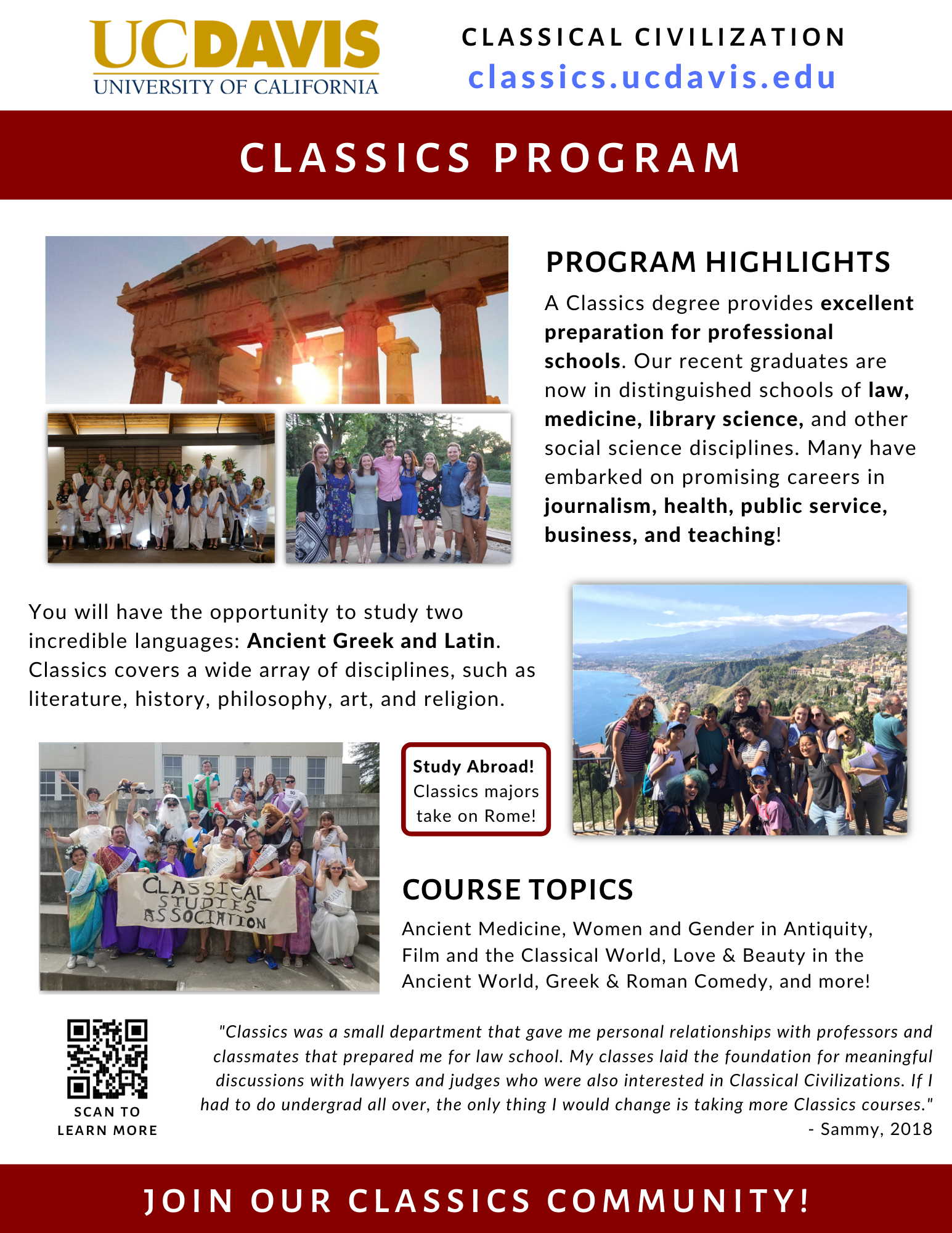Greetings from all over the world!
PowerPoint: Classical Civilization Presentation and Major Overview
Please download the Classics Presentation PowerPoint from Box, play the presentation, and listen to the audio! You will have to manually click to get to the next slide. There is a transcript below for your convenience.

Helpful Links:
- Classics Major Overview
- Video: UC Davis Classics Major
- What can I do with a Classical Civilization major?
- College of Letters and Science
- Orientation
- Davis Language Center
- Global Learning Hub
- Center for Student Involvement
Follow our Instagram!

Classics Presentation Transcript
Slide 1
Hi everyone! Congrats on your acceptance into UC Davis! As you watch this presentation, there will be audio on every slide, so when the audio is finished, be sure to manually click to the next slide.
Slide 2
If you are watching this presentation, chances are that you are part of the Languages & Literatures community! Sometimes we just call ourselves “LangLit” for short, and we are a collection of majors and programs at UC Davis focused on the humanities and world languages and cultures!
Slide 3
On campus, we are located at Sproul Hall, which is a short walk away from the Shields Library or the Memorial Union/Quad! Fun fact: At 9 floors high, we are one of the tallest buildings in Davis!
On the right, you’ll see a list of programs within Languages & Literatures, and you probably see your own hopeful major too! Whenever you come by for major advising, you’ll find us on the 2nd floor.
Slide 4
Now, let’s be more a little more specific: if you are watching this virtual presentation, you probably signed up for UC Davis as a Classical Civilization major! Or, Classics for short.
Slide 5
Introductions: My name is Lauren Wong, and I am the undergraduate program coordinator and advisor for Classics. If you have more questions after this presentation, feel free to reach out to me through my email on the screen.
Some fun facts about me: I can spin a basketball on any of my right fingers, I have an unhealthy coffee addiction, and I am actually a UC Davis graduate myself!
Slide 6
In terms of my role as your advisor, I am here to explain your major requirements and work with you on developing your academic plan! Beyond the realm of academia, I am here to listen to your questions and experiences, share opportunities for professional development on campus, and help you hope in yourself during challenging times that may come.
Slide 7
Let’s talk about the Classics program! First of all, what is Classics? Classics is the study the literature, philosophy, art, and history of ancient Greece and Rome, two cultures that continue to exert great influence over our contemporary institutions and modern imaginations. Studying these societies means exploring the complicated richness of antiquity’s enduring legacy and learning how the past shapes our present, even when we may not be aware of it.
Slide 8
It would be helpful for you to visit our website, classics.ucdavis.edu, when you have spare time. Check out the orientation page under the “undergraduate” tab for regular updates. Under the “undergraduate” tab too is a Classics overview page that details the major requirements for Classics major. This will be helpful when it comes time to register for fall classes in the summer.
Side note: Be on the lookout for emails from the College of Letters & Science about Aggie 101, Aggie Advising, and Aggie Orientation. These are resources that will help you with course registration questions. Be sure to set up a remote advising appointment with your College of Letters & Science advisors over the summer!
Back to Classics: You will see the major has two different tracks. Track 1 is Classical and Mediterranean Civilization and Track 2 is Classical Languages and Literatures.
Most students choose the Classical and Mediterranean Civilization track. It requires two years of study of one ancient language, Latin or Greek, and students select ten courses covering different aspects of ancient Mediterranean civilization. By the end of the major you should be able to read some of the most treasured literary works in world history in their original form, written over 2000 years ago.
For students who choose the second track, Classical Languages and Literatures, you will study both Latin and Greek, but take fewer ancient civilization courses. This track will unlock ever more material, as you become capable of reading Homer and Plato in Greek, as well as Vergil and Cicero in Latin.
Be sure to visit the “people page” on the Classics website and get in contact with one of our faculty advisors, such as Professor Colin Webster.
Slide 9
Program highlights... as I already mentioned, you’ll get to learn ancient Greek or Latin (or both)! Both tracks within the major are only about 60-70 units, meaning they are small enough for you to easily double major or minor in another program of your choice at UCD, such as a STEM field, another humanities program, and more! Our small courses provide space for meaningful connections with your other classmates and professors. A bit later in the presentation, I will also talk about study abroad opportunities.
A Classics major prepares you well for professional and graduate school. This major is the foundation for a broad range of careers in law, medicine, education, journalism, and more. How so you ask?
Slide 10
Transferable skills! Classics will teach you how to research and analyze challenging topics, how to formulate powerful questions, how to articulate ideas, how to write and think under pressure, and more. If you have any doubts, just look at Dr. Anthony Fauci, the director of the National Institute of Allergy and Infectious Diseases, who is one of the leading members of the White House Coronavirus task force and was a Classics major!
Slide 11
There are so many skills you gain through the Classics program beyond language acquisition.
Language/translation skills: Why not impress your family, friends, and secret admirers by telling them that you can indeed read Vergil in the original Latin and Homer in the original Greek? Learning Latin and Greek in particular provides incredible insight into the formation of English and the technical vocabulary of science, medicine and law.
Qualitative analysis: Classics courses provide ample experience for students to analyze texts and arguments for meaning, depth, and coherence. In this major, you learn how to decide what intellectual tools are best suited to accomplish a given task.
Written Communication: It is important that you know how to persuasively articulate your thoughts in the professional world. Responding to literary and historical texts in Classics courses will sharpen your written communication expertise, and the upper division courses work together to develop powerful argumentative skills.
Reading Comprehension: In the professional world, it is important to understand written communications accurately. Carefully examining ancient texts that delve deep into foundational human concepts will sharpen your reading comprehension and help you to understand nuanced arguments with precision.
Critical Thinking: It is crucial that you know how to analyze issues in society. Classics courses teach you how to ask productive questions and how to think about the world through someone else's eyes. The past helps you interrogate the present, while the present helps us interrogate the past.
Growth mindset: It is difficult to learn the nuances of a new language. Studying Greek or Latin in your Classics major demonstrates self-motivation and reveals an ability to push through challenges and receive constant feedback with a growth mindset. It demonstrates your exceptional level of commitment to law, medical or graduate schools, as well as potential employers.
One point I want you to remember is that your major doesn’t equal your career. Always think about what skills you want to sharpen.
Slide 12
With a Classics degree, you’ll be able to pursue anything and everything! Look on our orientation tab on the Classics website to read an article titled: “What can I do with a Classical Civilization major?”
Slide 13
Some notes on language placement: If you have prior background in Greek or Latin, you may consider taking the placement test through the Davis Language Center. Please be sure to speak to the College of Letters & Science advisor about this during your remote advising appointment, especially if you have AP/IB exam credit in Latin/Greek.
Slides 14-15
As promised, let’s talk a little bit about study abroad. On the next slide is a mini testimonial by Ethan, a Classics major, who studied abroad at the Intercollegiate Center for Classical Studies in Rome. Be sure to pause the video and read about his experience!
Slide 16
If you have questions about study abroad, visit globallearning.ucdavis.edu!
Slide 17
There are endless internship opportunities available to you at UCD. To name a couple, be sure to look into the UC Sacramento Center and Washington Program! These are internships that take place in the capitals of the state and country! You definitely don’t need to be a Political Science major to participate – there are many humanities and language-based internships available through these programs too.
Slide 18
On campus, there are also other opportunities for you to get involved. Sproul hall offers language tutoring at all levels, and there are many clubs that you can join to meet more people and form friendships, such as the Classical Studies Association. Check out csi.ucdavis.edu for a fuller list of the student organizations at UCD.
Slide 19
Also, if are an avid Instagram user, make sure you go follow us @ucdlanglit to stay connected and updated!
Slides 20-21
And lastly, just final thoughts. Here are some pictures of our Classics community. The faculty and staff are all here to support you and celebrate your achievements. We look forward to what you will accomplish here in the Classics program!
